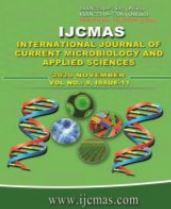


 National Academy of Agricultural Sciences (NAAS)
National Academy of Agricultural Sciences (NAAS)

|
PRINT ISSN : 2319-7692
Online ISSN : 2319-7706 Issues : 12 per year Publisher : Excellent Publishers Email : editorijcmas@gmail.com / submit@ijcmas.com Editor-in-chief: Dr.M.Prakash Index Copernicus ICV 2018: 95.39 NAAS RATING 2020: 5.38 |
Cereals and legumes are largely grown under harsh rainfed conditions in India, which is further complicated by climate change and climate variability. Tropical drylands are experiencing deficit rainfall over the years. Due to this, agricultural production is affected in arid and semi arid regions. There is an urgent need to find low cost, ecofriendly, sustainable solutions to manage crop productivity under rainfed situations to help resource poor small and marginal farmers in particular. Plant microbiome interactions offer plants to tide over adverse conditions viz., biotic and abiotic stresses through their various activities. The mechanisms they employ under moisture stress conditions include; synthesis and accumulation of biochemical compounds like proline and sugars, regulation of ethylene synthesis, production of phytohormones and exopolysaccharides, enhancement of root growth, regulation of gene expression etc. In addition to water deficit stress, drylands are also deficient in various plant nutrients. Consortia of microorganisms with multiple improved functions such as nitrogen fixation, drought tolerance, nutrient mobilization and solubilization have a potential to improve drought tolerance, plant growth and development under rainfed conditions.
 |
 |
 |
 |
 |